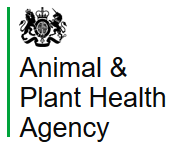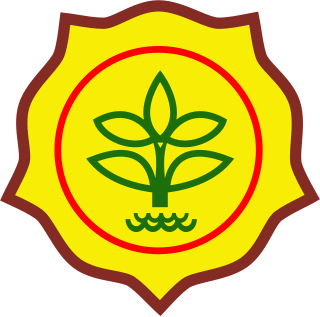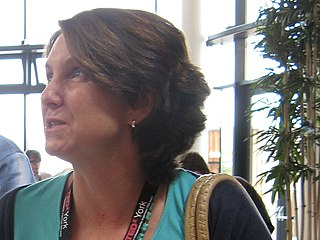Related Research Articles

A bean is the seed of several plants in the family Fabaceae, which are used as vegetables for human or animal food. They can be cooked in many different ways, including boiling, frying, and baking, and are used in many traditional dishes throughout the world.

The Department for Environment, Food and Rural Affairs (Defra) is a ministerial department of the Government of the United Kingdom. It is responsible for environmental protection, food production and standards, agriculture, fisheries and rural communities in the entire United Kingdom. Concordats set out agreed frameworks for co operation, between it and the Scottish Government, Welsh Government and Northern Ireland Executive, which have devolved responsibilities for these matters in their respective nations.

The government agencies in Sweden are state-controlled organizations that act independently to carry out the policies of the Government of Sweden. The ministries are relatively small and merely policy-making organizations, allowed to monitor the agencies and preparing decision and policy papers for the government as a collective body to decide upon.
The Central Science Laboratory (CSL) was an executive agency of the UK government branch, the Department for Environment, Food and Rural Affairs (DEFRA). It is now part of the Food and Environment Research Agency, which is in turn part of DEFRA.
The Centre for Environment, Fisheries and Aquaculture Science (Cefas) is an executive agency of the United Kingdom government Department for Environment, Food and Rural Affairs (Defra). It carries out a wide range of research, advisory, consultancy, monitoring and training activities for a large number of customers around the world.

Boehringer Ingelheim Animal Health is a multinational animal health company, formed in January 2017 when Merial was acquired by Boehringer Ingelheim and merged with Boehringer Ingelheim's existing animal health assets.

Soil contamination, soil pollution, or land pollution as a part of land degradation is caused by the presence of xenobiotic (human-made) chemicals or other alteration in the natural soil environment. It is typically caused by industrial activity, agricultural chemicals or improper disposal of waste. The most common chemicals involved are petroleum hydrocarbons, polynuclear aromatic hydrocarbons, solvents, pesticides, lead, and other heavy metals. Contamination is correlated with the degree of industrialization and intensity of chemical substance. The concern over soil contamination stems primarily from health risks, from direct contact with the contaminated soil, vapour from the contaminants, or from secondary contamination of water supplies within and underlying the soil. Mapping of contaminated soil sites and the resulting clean ups are time-consuming and expensive tasks, and require expertise in geology, hydrology, chemistry, computer modelling, and GIS in Environmental Contamination, as well as an appreciation of the history of industrial chemistry.
The Atmospheric Dispersion Modelling Liaison Committee (ADMLC) is composed of representatives from government departments, agencies and private consultancies. The ADMLC's main aim is to review current understanding of atmospheric dispersion and related phenomena for application primarily in the authorization or licensing of pollutant emissions to the atmosphere from industrial, commercial or institutional sites.

SASA is a division of the Scottish Government Agriculture and Rural Economy Directorate. It provides scientific advice and support on a range of agricultural and environmental topics to the Scottish Government.
Neonicotinoids are a class of neuro-active insecticides chemically similar to nicotine, developed by scientists at Shell and Bayer in the 1980s.
The National Bee Unit (NBU) runs Bee Health Programmes in England and Wales. The NBU consists of around 60 field-based Bee Inspectors and staff based in Sand Hutton, North Yorkshire.

Clothianidin is an insecticide developed by Takeda Chemical Industries and Bayer AG. Similar to thiamethoxam and imidacloprid, it is a neonicotinoid. Neonicotinoids are a class of insecticides that are chemically similar to nicotine, which has been used as a pesticide since the late 1700s. Clothianidin and other neonicotinoids act on the central nervous system of insects as an agonist of nAChR, the same receptor as acetylcholine, the neurotransmitter that stimulates and activating post-synaptic acetylcholine receptors but not inhibiting AChE. Clothianidin and other neonicotinoids were developed to last longer than nicotine, which is more toxic and which breaks down too quickly in the environment.
Following the 2010 United Kingdom general election, the UK Government under the Cameron–Clegg coalition announced plans to curb public spending through the abolition of a large number of quasi-autonomous non-governmental organisations (quangos). This was styled in the national press as a "bonfire of the quangos", making reference to Girolamo Savonarola's religiously inspired Bonfire of the Vanities.

The Animal and Plant Health Agency (APHA), formerly known as the Animal Health and Veterinary Laboratories Agency (AHVLA), is an executive agency of the Department for Environment, Food and Rural Affairs (Defra) of the United Kingdom.

It is estimated that 290 million tonnes of waste was produced in the United Kingdom in 2008 but volumes are declining. In 2012 municipal solid waste generation was almost 30 million tonnes, according to Waste Atlas Platform.

The Ministry of Agriculture is a government ministry which oversees the development of agriculture in Indonesia. It is headed by a Minister of Agriculture, who is directly responsible to President.

Nicola Jane Spence is the Chief Plant Health Officer and Deputy Director for plant and bee health at the Department for Environment, Food and Rural Affairs.

The Minister of State for Food, Farming and Fisheries is a mid-level position in the Department for Environment, Food and Rural Affairs in the British government. It is currently held by Mark Spencer, who took office on 7 September 2022.
Clavibacter sepedonicus is a species of bacteria in the genus Clavibacter. C. sepedonicus is a high-profile alien plant pathogen of A2 Quarantine status affecting only potatoes. It causes a disease in potatoes known as 'ring rot' due to the way it rots vascular tissue inside potato tubers It is present in parts of Europe but is under statutory control under 'Council Directive 93/85/EEC' of 4 October 1993 on the control of potato ring rot. This means that if an outbreak occurs, the outbreak must be controlled and if possible the disease has to be eradicated. If necessary, prohibitions are put into place to prevent further spread.
The National Collection of Plant Pathogenic Bacteria (NCPPB) is a bacterial culture repository hosted and maintained by Fera Science in York, United Kingdom. It specializes in bacterial plant pathogens and related bacteria. The NCPPB maintains over 3,500 strains and cultures which can be ordered online for use in education and research. The service is funded by the UK Government via the Department for Environment, Food and Rural Affairs (Defra) and provides support to the UK Plant Health Service.
References
- ↑ "The Food and Environment Research Agency". GOV.UK. 11 February 2015. Retrieved 11 June 2021.
- ↑ "Completion of the sale of stake in Fera". fera.co.uk. 18 January 2024. Retrieved 3 July 2024.
- ↑ "National Collection of Plant Pathogenic Bacteria".